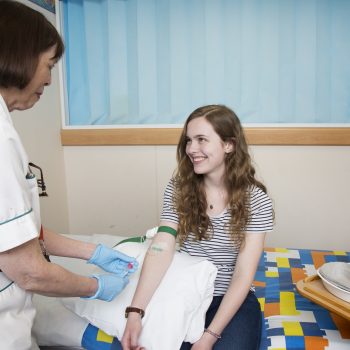Cambridge CRF receives new funding boost for delivery of early stage clinical research
The NIHR Cambridge Clinical Research Facility (CRF) has been awarded new funding to support its research over the next 5 years, including an uplift on historical funding levels.
The CRF supports studies which test new treatments in patients for the very first time (first-in-human trials), through to early, (Phase IIa) trials evaluating drug efficacy or mechanisms of disease. They provide specialist facilities and staff expertise to support research studies funded by the NIHR, Charities, the life sciences industry and other organisations. NIHR Cambridge CRF works closely with other NIHR infrastructure on the Cambridge Biomedical Campus, including the NIHR Cambridge Biomedical Research Centre and NIHR BioResource, to support ‘translational research’ (sometimes called experimental medicine) that takes scientific discoveries from the pre-clinical stage to new diagnostics, preventive medicine and treatments that can be used in the NHS.

Professor Krishna Chatterjee, Director of NIHR Cambridge Clinical Research Facility, pictured left, stated: “We are delighted to have received an increase in funding with which we will continue to translate discovery science into improved health for patients and people across diverse populations”.
Professor Lucy Chappell, Chief Executive of the NIHR and Chief Scientific Adviser to the Department of Health and Social Care, said: “NIHR’s CRFs scheme has been a key force in translational research across England, helping to position the nation as internationally competitive in early stage clinical research. This new funding, a 43% increase, will allow the CRFs to continue to drive forward innovation in experimental medicine and support translation of exciting discoveries into new treatments for patients.”
More than a decade of delivering innovative research
Since first funded by the NIHR in 2012, the research delivered by CRFs has provided faster access for patients to novel treatments and supported growth in early stage research in England, translating new advances into patient benefit and wider economic gain.
Cambridge CRF has supported an impressive array of research studies that have made a dramatic impact on healthcare locally, and across the country. Innovations such as the artificial pancreas for treatment of diabetes, a device (cytosponge) for diagnosis of oesophageal precancer and alemtuzumab therapy for multiple sclerosis are amongst the lifechanging advances, made possible through the facility.
At the forefront of early stage COVID-19 research
The CRFs were a crucial component of the nation’s COVID-19 response, supporting the delivery of early phase experimental medicine studies and Urgent Public Health studies. The CRFs’ knowledge and expertise, as well as the availability of existing facilities and networks, ensured studies were delivered quickly, safely and in an efficient and coordinated way. Throughout the pandemic, Cambridge CRF has played a key role in local, COVID-19 research efforts on the Cambridge Biomedical Campus. In the earliest days of the pandemic, the CRF led testing and validation of a new diagnostic (SAMBA II test), enabling rapid diagnosis of SARS-CoV-2 infections in patients needing admission to Cambridge University Hospitals (CUH), helping to keep other patients and staff safe. Their staff and facilities have also played a key role in supporting key, national studies (e.g. RECOVERY) of COVID therapies and trials (e.g. ChadOx, COVBOOST) evaluating COVID vaccines.



